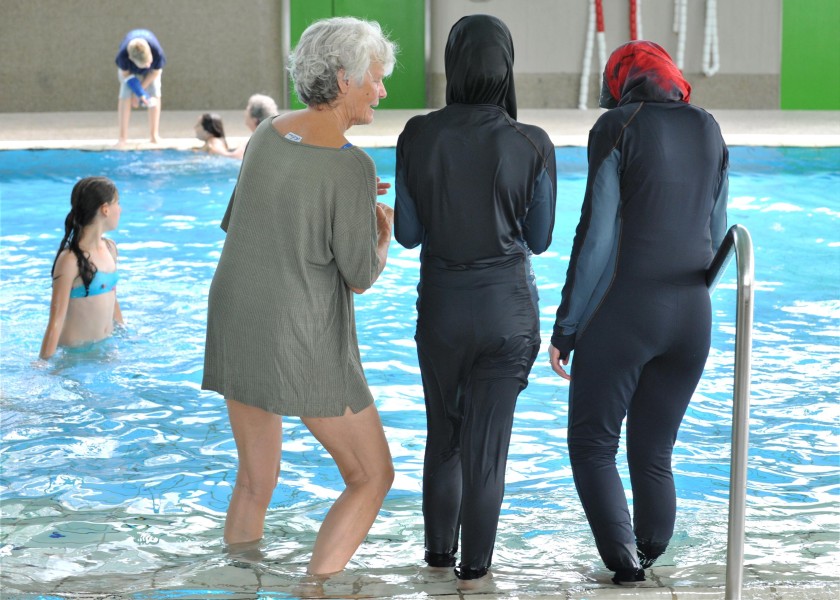Germany: Co-ed Swimming Goes to Court
A German court has refused to allow a Muslim student to skip co-ed swimming lessons based on her religious beliefs.
Germany: Co-ed Swimming Goes to Court
Soeren Kern | Gatestone Institute | October 9, 2012
A German court has refused to allow a Muslim student to skip co-ed swimming lessons based on her religious beliefs.
The case is an example of the growing number of conflicts between German school officials and Muslim parents who want to keep their children from participating in sports activities, biology classes and field trips out of religious reasons.
The 12-year-old girl, originally from Morocco, but now attending a school in the German city of Frankfurt, had refused to take part in swimming lessons because she said she was uncomfortable being close to bare-chested boys.
After the girl’s teachers gave her a lower grade for failing to attend the lessons, her family filed a lawsuit in which they argued that, according to Islam, the girl was not only forbidden from showing herself to boys, but also from seeing the topless boys.
On September 28, the Hessian Administrative Court in Kassel rejected the girl’s plea and ordered her to begin attending swimming lessons without further delay.
The presiding judge, Hans Rothaug, declared: “The applicant should have attended swimming lessons. In this particular case, there are no grounds for exemptions.”
In its ruling, the court said the girl could wear the full-body swimsuit (also known as the “burkini”), which is already being used by several other Muslim girls at her school, and that this solution would be sufficient to guarantee her religious freedom.
Citing an earlier ruling by Germany’s constitutional court, the court also stated that one of the objectives of the education system is to promote integration, and that the fundamental rights of the freedom of religion must be balanced with the rules established by the school.
In this context, the court said that religious minorities are required to avoid segregating themselves from the society at large, and that the girl must find a way to reconcile her religious beliefs and her obligation to integrate.
Rothaug said that while he had no doubt that the girl was sincere about her religious convictions, “a burkini is a swimsuit that meets the dress code of Islam” and wearing one would be an “acceptable solution” to her problem. He pointed out that four out of five students at her school, the Helene-Lange Schule, have an immigrant background, and that more than one-third are Muslims.
In any case, the court also noted that the family had chosen to live in Germany, where mixed swimming classes are the norm.
The girl’s lawyer, Klaus Meissner, said she does not want to wear a burkini because “it’s a plastic bag and makes her look ugly.” In addition, seeing other boys and girls violates her modesty. “I do not want to see boy in short clothes. I do not like this,” the girl said. In an earlier ruling, a lower court in Frankfurt had already rejected the girl’s case.
Other administrative courts in Germany have ruled similarly in similar cases, but because of the fundamental importance of the question, the court in Kassel said it would ask the Federal Administrative Court (one of the five federal supreme courts in Germany) to review the case.
In June 2012, an administrative court in the northern German city of Bremen ruled that Muslim primary school students are not eligible for exemption from co-ed swimming lessons and that even in grade school special exemptions can be claimed only after the onset of puberty.
In 2009, the Ministry of Education in the German state of North Rhine-Westphalia stated that Muslim students must attend swimming lessons and participate in school trips.
In May 2008, a court in Düsseldorf ordered a 12-year-old Muslim girl to participate in co-ed swimming lessons. The court ruled that although the obligation to attend swimming lessons with boys does represent an infringement on the freedom of religion, the state’s educational mission is more important. In any case, the problem could be greatly reduced by wearing swimwear that does not hug the body.
In a landmark case in June 2005, an administrative court in Düsseldorf dismissed a complaint brought by two Muslim parents from Wuppertal who wanted to keep their 11-year-old son out of a co-ed school swimming class. The parents had argued that in the swimming pool, the young boy could not avoid seeing his female classmates in their bathing suits, and that this amounted to “a dangerous influence on the emotional world of young people.”
But the court rejected their case, saying that religious beliefs are not a reason to prevent children from attending swimming classes and said that the boy must attend them in the future. In a precedent-setting ruling, Chief Judge Uwe Sievers stated: “Religious convictions stand, in this case, against the duty of the school. But it is not the task of this court to challenge the Koran. Instead, we have to try to reconcile both interests. Besides, we live in a Western society in which we do not live by the rules of the Koran. And as on the street, the youngster can close his eyes to the girls…or wear long swimming trunks.”
Soeren Kern is a Senior Fellow at the New York-based Gatestone Institute. He is also Senior Fellow for European Politics at the Madrid-based Grupo de Estudios Estratégicos / Strategic Studies Group. Follow him on Facebook and on Twitter.
Link to Original Article: http://www.gatestoneinstitute.org/3386/germany-co-ed-swimming




